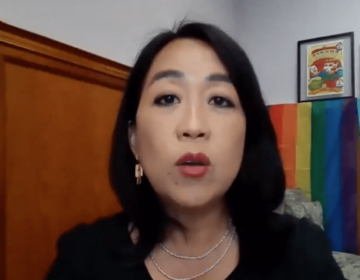Pa. Haitian community hails temporary protected status, questions immigration future
Haitians in Pennsylvania are celebrating a move by President Joe Biden’s administration that effectively reverses another immigration policy of former President Donald Trump.

Secretary of Homeland Security Alejandro Mayorkas speaks with the news media outside of the Little Haiti Cultural Center, Tuesday, May 25, 2021, in Miami. Mayorkas met with community leaders following the announcement of a new 18-month designation for Haiti for Temporary Protected Status (TPS). (AP Photo/Lynne Sladky)
This story originally appeared on WITF.
Haitians in Pennsylvania are celebrating a move by President Joe Biden’s administration that effectively reverses another immigration policy of former President Donald Trump.
Undocumented Haitians in the United States can now apply for Temporary Protected Status, or TPS. The status allows those who are eligible to legally live and work in the country for the next 18 months.
Josephys Dafils is a social worker and the director of Haitian-American United For Change in Philadelphia, which has perhaps the state’s largest Haitian community.
Dafils said the change will help protect Haitians not only from deportation, but also provide access to legitimate employment and protection from exploitation.
“It’s affecting us in a positive way, keeping out of poverty and keeping people away from abuse because a lot of them are being abused,” said Dafils, who is from Haiti. “There’s abuse taking place because when someone knows that you don’t have your legal papers, [people can say to them] if you don’t do this for me, ‘then I’ll report you to immigration.’”
The protected status had been afforded to Haitians in the U.S. after the 2010 earthquake and subsequently renewed for years. The Trump administration moved to end TPS for previously undocumented Haitians in 2017. Injunctions in court cases challenging Trump’s move kept some Haitians’ TPS status intact.
The change is expected to affect more than 100,000 Haitians across the nation. Some 14,000 Haitian TPS holders were living in the commonwealth in 2017, according to federal immigration authorities.
Alexander Civil of Berks County said he has seen the Haitian community grow in cities like Reading. Like many other Latinos who have settled in the Route 222 corridor, Civil said some Haitians from nearby New Jersey and New York are attracted to the lower cost of living.
Both Civil and Dafils said their nonprofit groups are aiming to work with immigration lawyers and groups to inform eligible undocumented Haitians about the development.
“Some people still feel like, “this might be a way [for immigration authorities] to try to get me and deport me,” Civil said. “So you have to explain that to individuals that this is legit, you can still get your people to apply for this.”
Civil also is from Haiti and is the executive director of the nonprofit organization Bring The Change in Reading. The nonprofit promotes cultural diversity and recently helped organize the first Haitian raising ceremony at Reading City Hall.
Civil said events like the flag raising helps make Haitians more visible and gives them an opportunity to interact with their local government officials.
“There’s more to just going home, going to church and coming home, or going to school and coming home,” Civil said. “You got to be part of the community that you live in.”
And while the TPS development has taken weight off the shoulders of some Haitians in the state, Civil acknowledged that TPS is not a permanent solution for his community.
“I think, definitely, the extension of the TPS for Haitians is great news that was really welcomed by everyone. But it should also be pointed out, it’s only for 18 months, which is a year and a half. After that, we’re gonna have to go back to the discussion, ‘Okay, what’s next?’”
Immigration reform has been a key component in Biden’s agenda, and a wave of asylum seekers from Central America has been a test piece in his first months in office. Biden also recently ramped up deportations of Haitians using a Trump-era policy.
Biden has presented an immigration reform bill to Congress, which has an eight year path to citizenship. Biden has also encouraged lawmakers to pass piecemeal reform if possible.
While the future is still unclear for the nation’s undocumented Haitians, the moment does provide some respite.
“At least there is a second chance, that is the core of the American Dream — a second chance,” Dafils said.
Anthony Orozco is part of the “Report for America” program — a national service effort that places journalists in newsrooms across the country to report on under-covered topics and communities.
WHYY is your source for fact-based, in-depth journalism and information. As a nonprofit organization, we rely on financial support from readers like you. Please give today.






